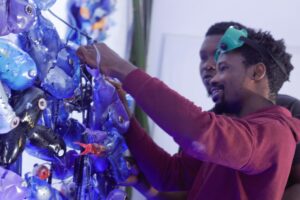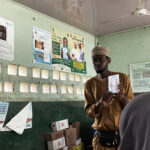Amid a landscape littered with plastic bottles and discarded cans, Gbenga Adeku sees what most overlook: potential. Where others see waste, he sees stories waiting to be told. “I was driven by guilt,” he admits, recalling the sight of waste piling up in Nigeria’s landfills. That guilt, however, soon transformed into a purpose, inspiring him to turn waste into art that educates, empowers, and fosters a community fight against plastic pollution.
Adeku’s sculptures and installations, crafted from PET bottles and aluminium cans, carry powerful messages of sustainability and hope. His approach merges creativity with activism, challenging Nigeria’s perception of both art and waste. As his work gains recognition, he’s redefining how art can inspire change and what trash can become.
“My father was an artist, and I spent much of my adolescence as his apprentice,” Adeku shares. It was in his father’s studio that he developed foundational skills in painting and sculpting. After earning a degree in fine and applied arts from Obafemi Awolowo University, he started a career in freelance illustration, but the sight of plastic clogging waterways and streets haunted him. “There was a time when I saw solid waste everywhere, but I wasn’t sure how to make a difference,” he recalls. In 2019, after researching sustainable art, he began focusing on upcycled creations that quickly grew from small pieces to large, immersive installations confronting Nigeria’s waste crisis.
Adeku’s work is rooted in a belief that waste, especially plastic, can be art and a catalyst for behaviour change. His signature series of sculptures, depicting ants and fish made from PET bottles, explore themes of survival and ecological fragility. “Ants symbolise cooperation and hard work, while fish represent life at risk due to plastic pollution,” he explains. These sculptures not only provoke thought but also encourage viewers to reconsider their relationship with waste.

Outside gallery walls, Adeku’s art has expanded through partnerships with organisations and companies. His collaboration with Nike’s flagship store in Nigeria led to eco-friendly merchandise that champions sustainability. “Working with Nike was incredible; I saw how art can merge with popular culture to drive change,” he says, beaming.
Some of Adeku’s installations also involve communities directly in collecting and recycling waste. “When people see how waste can transform into something beautiful, it changes their perspective,” he notes. “They start thinking twice before tossing a plastic bottle away.”
Through workshops, Adeku shares his craft with artists and young creatives, demonstrating how discarded materials can become meaningful art. His aim is to inspire a new generation of eco-artists who view waste as a resource, not garbage. “I want to nurture eco-artists who are ambassadors for the environment,” he says warmly.
The impact of Adeku’s work goes beyond aesthetics. By fostering a recycling culture, he addresses Nigeria’s pressing environmental issues, such as blocked waterways and overflowing landfills. His projects even spur economic activity by encouraging communities, through a reward system, to collect plastic waste for art. “It’s not just about art; it’s about giving people the means to be part of the solution,” Adeku says.
Looking ahead, Adeku envisions travelling exhibitions and educational programmes to spread his message. “Art connects emotionally, and when people feel connected, they’re more likely to act,” he says. He dreams of eco-art permeating Nigeria’s culture, embedding sustainability into every industry.
With each new installation and partnership, Adeku reaffirms his mission: waste doesn’t have to be a problem; it can be part of the solution. His art offers a glimpse into a future where environmental responsibility and artistic expression work hand in hand towards a sustainable world.
As Adeku says, “We can’t escape the fact that plastic will persist, but we can choose what to do with it. My art is my way of saying: if it must last, let it last beautifully.”
Artist Gbenga Adeku sees potential in waste material, particularly plastic bottles and aluminum cans, and transforms them into meaningful art to communicate messages of sustainability and community involvement against plastic pollution in Nigeria. Motivated by the overwhelming waste in landfills, Adeku uses his skills in fine and applied arts, developed under the guidance of his father, to create sculptures and installations that prompt viewers to reconsider their relationship with waste. His notable series features ants and fish crafted from PET bottles, symbolizing cooperation and highlighting ecological fragility amidst plastic pollution.
Adeku's work extends beyond art galleries through collaborations with organizations like Nike, producing eco-friendly merchandise that merges art with popular culture to promote sustainability. His community involvement includes workshops and initiatives encouraging the collection and recycling of waste for art projects, fostering a culture of environmental responsibility and stimulating local economies through rewards for waste collection.
By nurturing a new generation of eco-artists and seeking to embed sustainability into Nigerian culture through art, Adeku aims to change perceptions about waste, proving it can be transformed into a resource. He plans to further expand his impact with traveling exhibitions and educational programs, advocating for environmental responsibility intertwined with artistic expression, and demonstrating that while plastic persists, it can be repurposed into something beautiful and meaningful.






